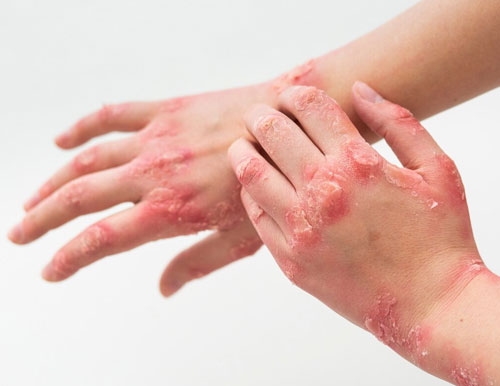Book an Appointment +91-95000 01177
The peripheral nervous system links the brain and spinal cord (central nervous system) to the body, including limbs, face, and internal organs. Responsible for transmitting signals about physical sensations to the brain, these nerves are referred to as “nadi” or channels in Ayurveda. Damage to these nerves can impede their function.

Schedule Your Healing Journey: Book an Appointment for Treatment.
Book an AppointmentThe peripheral nervous system connects the nerves from the brain and spinal cord, or central nervous system, to the rest of the body like the arms, hands, feet, legs, face and internal organs. These nerves deliver signals about physical sensations back to the brain. If the nerves are damaged, they fail to do their job. Ayurveda refers to them as nadi or channels.
There are three types of peripheral nerves:
- Sensory nerves, which connect to the skin (sensation)
- Motor nerves, which connect to the muscles (movement)
- Autonomic nerves, which connect to the internal organs (involuntary functions)
Some of the common causes for the condition are:
- Diabetes
- Genetic factors unrelated to diabetes
- Diseases that cause chronic inflammation and can spread to the nerves or damage connective tissue surrounding nerves
- Physical trauma caused by accidents, falls, or fractures.
- Prolonged sedentary lifestyle, or constant wrong posture
- Increased pressure on the joint/joints for prolonged periods
- Some medications used to control blood pressure, epilepsy, etc.,
- Statins, cholesterol-lowering drugs
- Deficiencies of vitamins E, B-1, B-6 and B-12
- Toxins
Diabetic neuropathy
Diabetic neuropathy is a common and serious complication of diabetes. Diabetes is a vascular disease. The excess sugar in the body keeps accumulating in the muscles and nerves system and disrupts brain signals and blood circulation. High blood sugar levels eventually damage the nerves throughout the body. Insulin-based medication causes inflammation and damage to the muscles.
This type of nerve damage can occur if one has been battling the disease for many years. Diabetic neuropathy most often damages nerves in the extremities, i.e. legs and feet.
Depending on which nerves are affected, symptoms of diabetic neuropathy can range from pain and numbness in the legs and feet to problems with the digestive system, urinary tract, blood vessels and heart. Some people have mild symptoms. But for others, diabetic neuropathy can be quite painful and debilitating.
Diabetic neuropathy can be prevented or its progression slowed by strictly controlling blood sugar and maintaining a healthy lifestyle through non-insulin based Ayurvedic medicines.
There are four main types of diabetic neuropathy. A patient can have one or more than one type of neuropathy at a time. The symptoms will depend on the type of disease and the nerves that are affected. Usually, symptoms develop gradually and may go noticed until considerable nerve damage has occurred.
Peripheral neuropathy
Peripheral neuropathy is the most common type of diabetic neuropathy. It affects the feet and legs first, followed by the hands and arms. Signs and symptoms of peripheral neuropathy are often worse at night, and may include:
- Numbness to pain or temperature changes
- Tingling or burning sensation
- Sharp pains or cramps
- Bone and joint pain
- Increased sensitivity to touch
- Muscle weakness
- Loss of reflexes, especially in the ankle
- Loss of balance and coordination
- Serious, unhealing ulcers, infections in the foot
Autonomic neuropathy
The autonomic nervous system controls the heart, bladder, stomach, intestines, sex organs and eyes. Autonomic neuropathy affects the non-voluntary, non-sensory nervous system. Diabetes can damage these nerves, possibly causing:
- A lack of awareness when going into hypoglycemia
- Urinary tract infections or urine retention or incontinence
- Constipation, uncontrolled diarrhea or both
- Stomach bloating, vomiting and loss of appetite
- Difficulty in swallowing
- Increased or decreased sweating
- Problems controlling body temperature
- Changes in the way eyes adjust from light to dark
- Increased heart rate while at rest
- Sharp drop in blood pressure after sitting or standing
- Erectile dysfunction
- Vaginal dryness
- Decreased sexual response
Diabetic amyotrophy
Diabetic amyotrophy is also known as proximal neuropathy or radiculoplexus neuropathy. It affects nerves in the thighs, hips, buttocks or legs. It’s more common in people with Type 2 diabetes and older adults.
Symptoms are usually experienced on one side of the body, but may spread to the other side. They include:
- Severe pain in the hip, thigh or buttock
- Eventual weakness and shrinking of thigh muscles
- Difficulty rising from a sitting position
- Abdominal swelling, if the abdomen is affected
- Weight loss
Most people with these conditions improve at least partially over time, though symptoms may worsen before they get better.
Mononeuropathy
Mononeuropathy, or focal neuropathy, is damage to a specific nerve in the face, middle of the body (torso) or leg. It’s most common in older adults. Mononeuropathy often strikes suddenly and can cause severe pain. However, it usually doesn’t cause any long-term problems.
Symptoms usually go away without treatment over a few weeks or months. The specific signs and symptoms depend on which nerve is involved. Pain may be experienced in any of these areas:
- Shin or foot
- Lower back or pelvis
- Front of thigh
- Chest or abdomen
Mononeuropathy may also cause nerve problems in the eyes and face, leading to:
- Difficulty focusing
- Double vision
- Pain behind one eye
- Paralysis on one side of the face
Sometimes mononeuropathy occurs when something is pressing on a nerve (nerve compression). Carpal tunnel syndrome is a common type of compression neuropathy in people with diabetes. It can cause numbness or tingling in the hand or fingers, except little finger. The patient’s hand may feel weak, and it may result in weak grip.
Diabetic Neuropathy Complications
Diabetic neuropathy can cause a number of serious complications, including:
- Foot sores and cuts may silently become severely infected or turn into ulcers. (Amputation of toes, foot or even the lower leg may be necessary)
- Joint damage
- Urinary tract infections and urinary incontinence
- Hypoglycemia unawareness
- Digestive problems like nausea, vomiting and bloating
- Sexual dysfunction. (Men may experience erectile dysfunction. Women may have difficulty with vaginal lubrication and arousal)
- Increased or decreased sweating. (Some people with autonomic neuropathy have excessive sweating, particularly at night or while eating. Too little or no sweating at all (anhidrosis) can be life-threatening)
The right treatment for neuropathy focuses on the underlying cause and measures to prevent deterioration of the condition. Timely intervention may achieve reversal or arresting of some of the symptoms.
In the case of diabetic neuropathy, controlling blood glucose is vital and insulin-based medications should be stopped. An Ayurvedic protocol should be followed to detoxify and rejuvenate the body. Punarjan’s Agnirasa treatment is effective in controlling and arresting the progression of diabetes.
Our medicines are non-insulin based and will not cause such side effects. Flamisolv is used to treat foot sores and ulcers. Medicines are prescribed as per the patient’s needs and constitution.
Happy Customers
"I had been struggling with diabetes for years, and nothing seemed to work effectively until I discovered Dr. E. Shaji Raj's Ayurvedic Arka Medicines. They have been a game-changer for me. My blood sugar levels are now under control, and I feel healthier than ever. Thank you, Dr. Shaji Raj!"
-John"I was skeptical about trying Ayurvedic remedies for diabetes, but after giving Dr. E. Shaji Raj's Arka Medicines a try, I'm a believer. These medicines have helped me manage my diabetes without the need for excessive medication. I feel more energetic and vibrant. Highly recommended!"
- Sarah"As someone who has tried various treatments to control diabetes, I can confidently say that Dr. E. Shaji Raj's Arka Medicines are the real deal. They are not only effective but also safe and natural. I've seen a significant improvement in my health, and I'm grateful for these life-changing remedies."
- RajeshAll our medicines are 100% ayurvedic arka medicine
- Formulated in the unique style of DR. E. Shaji raj. They are not some weak supplements. They are able to stand alone and efficiently cure diseases.
- Our medicines are extracts of medicinal plants, herbs, roots, tree barks in their purest forms
- No heavy metals, preservatives, sugar, Bad strong taste, artificial colours or hidden x-factors
- Our medicines can be used along with modern medicines till such time you wean yourself off modern medicine.
BlogsIn The Infinity Of Life, Take Time Out For The Soul
Read all blogsWith the drastic and unpredictable change in the climatic condition and increasing pollution in our environment the incidence of Sinusitis are increasing in our Country.
Read MoreThis informative piece sheds light on the nature of this chronic autoimmune condition, its potential causes, symptoms, and available treatment options.
Read More




